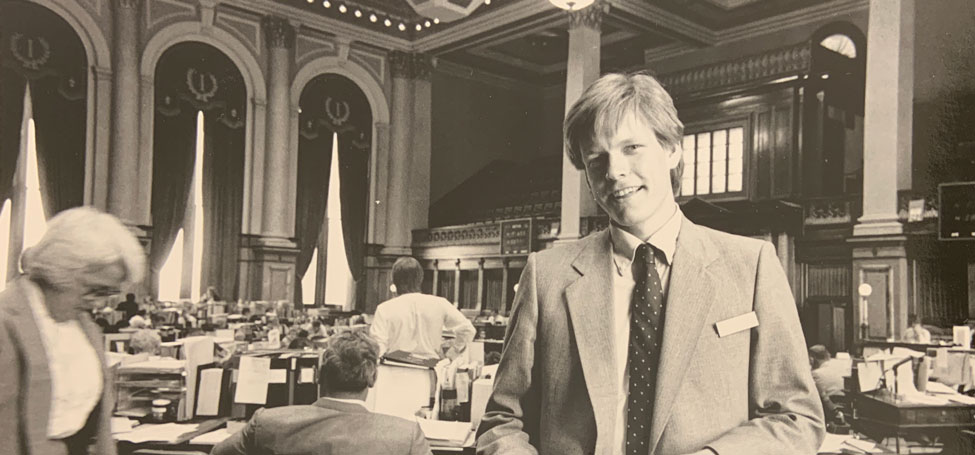From Internship to Leadership
This story is part of the series:
When English major Mark Couch ’87 was a senior at Grinnell, career planning wasn’t his top priority. He had vague ideas — maybe journalism, maybe law school – but little practical experience.
With help from Jo Calhoun, then internship coordinator and assistant director of the Career Development Office, he landed an internship in the Iowa Legislature with the chair of the house judiciary committee during the 1987 legislative session.
Twice a week Couch and several other students interning in Des Moines, Iowa, caught a 6 a.m. van shuttle from campus. At the state capitol, Couch handled typical intern chores, such as drafting responses to constituent letters.
His most significant project was researching other states’ laws for the legal sale of fireworks. At that time, fireworks sales in Iowa were strictly limited. The judiciary chair lived near the Iowa-Missouri border and watched Iowans cross the state line to buy fireworks.
“We collected the toughest restrictions from other states that allowed fireworks sales and assembled them into one bill,” Couch says.
To his amazement, it passed the house.
“I thought it was because we crafted the best bill ever. Really, it passed because my boss had a powerful position in the legislature,” Couch says. “The bill got killed right away in the senate.”
Although his bill didn’t change state law, the experience offered lessons to consider in pursuing a career. “I had learned how to hunt and gather useful information and how to present it clearly,” he says. “It also reminded me that the quality of the work isn’t the only — or even the decisive — factor in the ultimate outcome.”
Eventually, the experience turned out to be useful. But not right away.
His first job after graduation was stocking shelves at a bookstore in his hometown of Des Moines. After networking with friends, he landed an interview for a sales job with the Des Moines Business Record.
“If you had your druthers,” asked the sales manager, “would you rather be selling or writing?”
Writing, Couch said, figuring that would end the interview. Instead, he met the paper’s editor and got the job. “That job was like an apprenticeship,” he says. He covered three beats during his four years there, before finally landing a dream job at the Des Moines Register. “That started my journalism career,” he says.
From there, he jumped to other newspapers — the Fort Worth Star-Telegram, The Kansas City Star, and finally The Denver Post — “moving mostly for better pay.” He was a business reporter for most of his career, covering real estate and economic development, though he took only one economics course at Grinnell. “I read The Wall Street Journal every day,” Couch says. Grinnellians know how to learn.
While a reporter in Denver, he was assigned to cover the campaign of a prominent businessman, John Hickenlooper, who ran for mayor. “He was terrible as a debater, and I predicted he had no chance,” Couch says with a laugh. “But he won, and thus began my political reporting career.”
Couch was assigned to city hall to cover Mayor Hickenlooper. Several months later he was sent to cover state politics at the capital. “My experience in the Iowa Legislature had given me some perspective.” He didn’t want to cover predictable partisan debates. Instead, he wanted to learn how the state budget worked. From November to April, he attended budget committee hearings and learned the finer points of each department’s budget.
“To actually sit there day after day and really study it, all of that work I did at Grinnell as a student, learning how systems work and how human behavior interacts with those systems,” he says, “I got good at explaining a complicated system for the newspaper.”
But newspaper reporting as a career option was fading.
Couch’s expertise in the state budget combined with his communication skills made him a candidate for a job as a legislative liaison and public information officer for the Colorado Department of Revenue. He served as the department’s “flight traffic controller” by making sure subject-matter experts were available to testify for about 150 bills each legislative session. “It was fun but a grind,” he says.
In 2013 he moved into higher education as the director of communication for the University of Colorado School of Medicine. A few years later he was asked to be the new dean’s chief of staff, so he added that responsibility to his plate. “It’s a mix of practical and political and I still write every day,” he says.
For a student who enjoyed both political science and English but wasn’t sure how, or if, to blend those interests, his internship served as a practical launching point.

